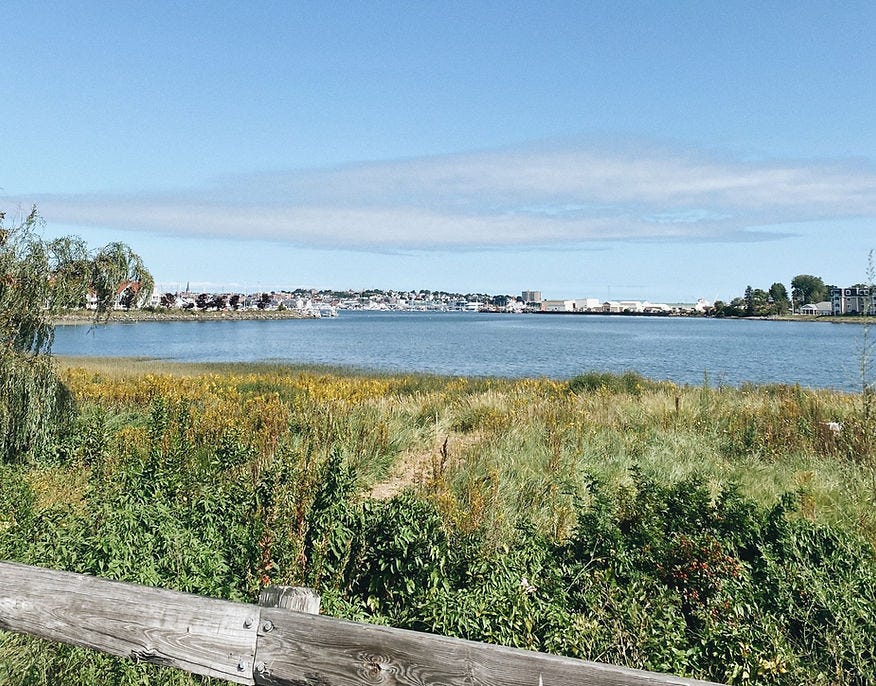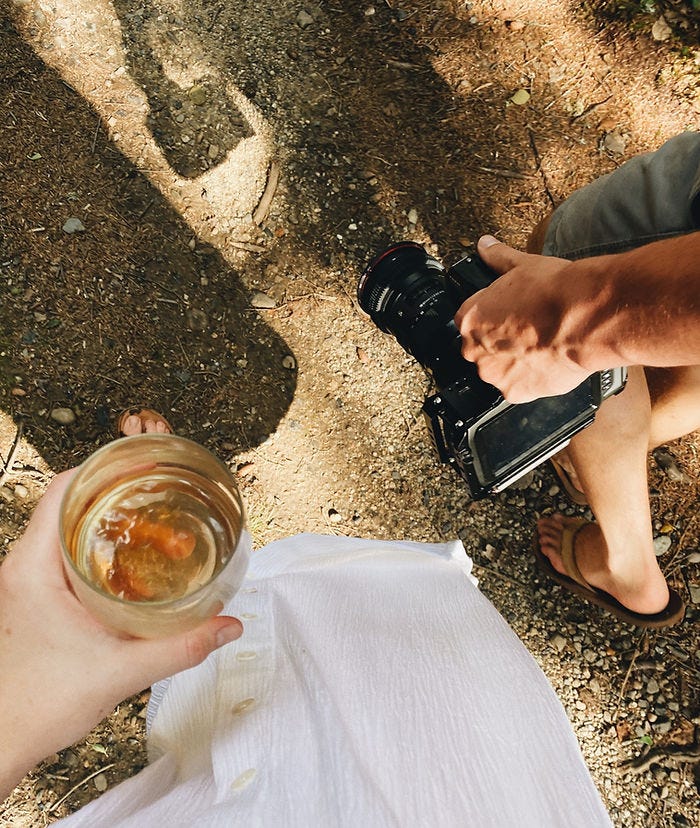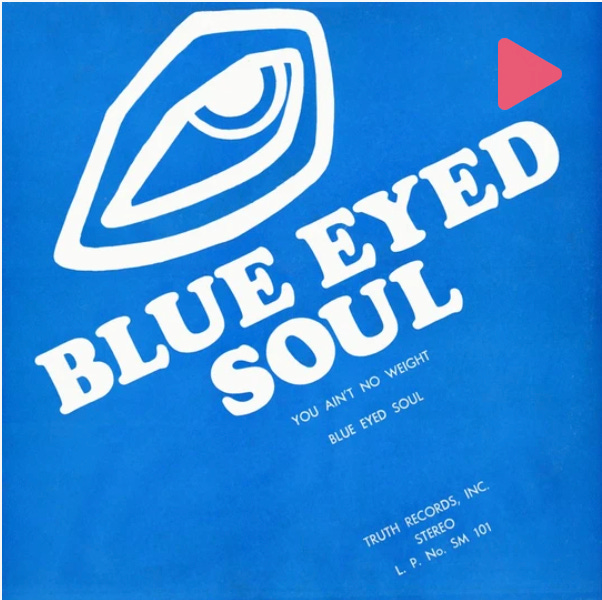excuse me while I disappear
FROM THE RAYON ARCHIVE -- SEPTEMBER 29, 2021
I've been compiling, nesting, eating hot gruel, sweatering, and feeling depressive. Thus is the liminal space between summer and autumn.
One day last week, before the cool weather brushed across the little peninsula of my city, I worked at a food truck in a local grocer's parking lot. From the backside of the building--where the big trucks port and the garbage cans are stored--you could see this view. I took a picture before hopping into a retro-fitted trailer, made swelteringly hot by a grilled cheese press. I found a placard later that indicated that the grocer worked to protect this space you see from development. A grocery store, which covered five acres of this marshy wetland in concrete, now boasts their preservation of the remaining 20 feet of shoreline.
I know I grow depressed in this season because of the lack of sun – after all, in Maine, we go from 16 hours of daylight to under 10 in a matter of seconds (well, months) – but it's hard to not consider that perhaps, as we leave the sun-dappled days of summer, with its natural, effervescent wine in the early afternoon, easily freckled skin, and warm nights, we start to lose some of its relentless optimism and start to get pissed off again about the collective human experience.
But listen to me get ahead of myself. Tonight, as I write this, I sit with the dog and listen to some music. It's a beautiful night. The front door is open, so he can look out of the screen door and watch the other beagles walk by. Some are old, some young, some chubby and none of them like him, half-beagle, half pound mutt. I know I'm truly feeling gloomy when I start to consider how lonely he must feel being a rescue in a middle-class town full of nice, pure-bred dogs. In spite of it all he is still so happy to gobble up a mouse carcass or chase a squirrel skyward into one of the big trees in the yard.
I listen tonight to Blue-Eyed Soul's 1980 record, You Ain't No Weight. It begins melancholic, with trembling organ over the lead's transcendent falsetto. That's all I'll say about that, I recently had a conversation with a sociology professor from college about talking about music. How we do it, and how the conversing itself often accomplishes what is so antithetical to what music, the great equalizer, is all about. My professor, let's call him Jack, invited me out for drinks last week. We caught up, talked about the state of the world – of which the monumental effort to qualify and comprehend was our primary course of study – and felt very comfortable in the company of each other. He wondered aloud about the future of his classes at the university and told me what he wanted to teach was a course about the sociology of music. When I asked him about his background in music theory, he wasn't sure what I meant. I said, perfect. I have long felt that the least properly musically educated folks are the ones I want to discuss music with. Especially when it comes to music that has cultural significance and could be considered as providing sociological insight into a group. Don't be surprised if the next time I'm suggested to listen to another music PhD student's Fiona Apple mopey, crooning sound-a-like, I abruptly pass away.
The title song in Blue-Eyed Soul's (only) record, Ain't No Weight, is the track I heavily favor. It appears in the playlist I compiled for remembering 2021's summer, as well as an ongoing playlist I call Cottage by the Sea whose tunes are rolling, roiling, melodic and reflective. The song appears in both quite separate playlists (the former includes Doja Cat, the latter, Jimmy Fontana) because it was loved and well-worn this summer. A summer of silky skin and clothes, new and old faces, ham sandwiches on baguettes, sweating through breasty shirts at Bubba's, oysters shucked at the beach, J coming home from work mid-day just to make love to me, nat sherman cigarettes, strawberry shortcake, and bruised, juicy peaches out on the porch.
I'm moving to Paris in just over a week. There, I said it. All this abundance and I am leaving it behind as abruptly as cool autumn glances over Maine in late September, dotting the forests with ruby red leaves and the town streets with yellow busses.
For every recent morning, J and I wake up, curled around each other. Usually I've been sleep-talking for a few minutes, he listens until I wake up and try to play it off. I work in the evenings so he's usually up first. I totter downstairs after him and either fall asleep, or become an almost belligerent conversationalist at the kitchen island while he arranges two slices of whole wheat sourdough bread with turkey, cheddar cheese, fresh greens and sometimes, my special spicy aioli (if I remember to make it). Then he leaves after at least 100 kisses, and I read in bed for another few hours, or go see my brand-new nephew. This is what I've gotten used to, an overwhelming love and the strange and new comfort of family. I leave it all on this side of the Atlantic in 11 days.
It turns out that big changes in life have a way of stirring up grief. I think often of this era I am leaving behind. It holds so much, in just five years. All my time at the university, my years in the city where I became an adult, fell in love, etc, etc. So many good bowls of ramen in five years, and I'm just supposed to forget about it all??
This liminal space between being uprooted from Portland and yet to settle in Paris, I remember my father. I think of a time, four years ago, when I tried to write my father a letter. To accomplish what, I no longer remember. Something about either boundaries or closure. Perhaps both. In the letter, I aimed to describe what nice memories we had together before coming to some powerful conclusion I never figured out. I got caught on the memory. When I think of my father, not the sunken figure trapped in a hospital bed by illness, but the lithe, jet black-haired young man I see myself held by in photos, I remember just this:
We're at the kitchen table, my dad is at the end where he always sat. I bustle around the kitchen, barely taller than the island counter. I make supper by warming up cans of Italian Wedding Soup, which is my favorite because it is very salty and has tiny round noodles. I am not rushing, I am only 6 or 7, and have no agenda or reason to believe that I don't have the rest of my life to make soup for my dad.
I boil water, pull out the delicate, paper thin teacups from the china cabinet, one is embossed with a Scottish flag, which I think is very important and some kind of heirloom so I set that one for my dad. The other has small flowers. I put two bags of cinnamon tea in the cups and deliver them to the table. Hot tea and hot soup. This was my idea of fine dining at 7. I draped a white kitchen towel over my forearm, held it out in front of me, and welcomed my dad to "Le Petit Cafe." My big dream was to be a famous chef in Paris. I thought constantly of life in Paris. I tried to learn French – I was homeschooled, so I had to borrow a book from the library – and watched every movie I could think of that took place in France (so mainly, Ratatouille and Aristocats). I don't remember what my dad does during service at Le Petit Cafe. Perhaps we talk, perhaps I talk, and he listens or at least gives me the impression he is listening.
As an adult whose dad is dead, these are the things I wish I remembered. Why the fuck do I remember a very cheap, Goodwill teacup, but not what he said? Even in the end, if I had remembered what he said, I still will never have known what it was that he thought. In my favorite poem, this is the great, heretical punch line, that what poetry really has to do with is not what is said, but what is thought.
In the end my dad did not speak either. He breathed shallowly and tried to stay alive. In the end, he likely didn't even think. But if he did think, his life flashing before his eyes, I wonder if he caught a glimpse of Le Petit Cafe. I certainly did more than once in those many hours of the liminal space between life and death that he occupied, not unlike the discomfort and dread we feel between seasons.
This isn't why I'm going to France. Or perhaps it is. I don't mean to be cryptic, I simply don't know what has driven me again and again to this place. By the end I'd like to look back on it, and when asked, be able to articulate that it was a deeply intimate quest for closure and self. Or maybe just the world's finest piece of marzipan.
When asked why he was so cryptic about his short-lived, '80s Brooklyn lounge duo, Blue-Eyed Soul, and why they never produced another record, songwriter, producer and organist Norman Marchelle responded simply: "It was a different time... Excuse me while I disappear."




